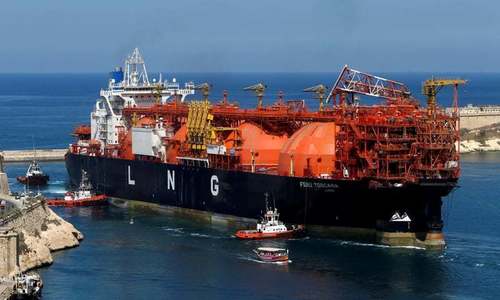ISLAMABAD: Making a new record, the state-run Pakistan State Oil (PSO) has purchased a cargo of liquefied natural gas (LNG) at $20.055 per unit (almost 27.9pc of Brent), the highest ever not only in the country but perhaps the second highest summer purchase in the world.
This comes at a time when the government was justifying $15.5 per million British thermal unit (MMBTU) purchases by Pakistan LNG Limited (PLL), another state-run entity, as the lesser evil when compared with alternative fuels.
As a result of the expensive LNG cargoes acquired through spot market by the two entities, the weighted average sale price for LNG (excluding GST) was notified by the Oil and Gas Regulatory Authority (Ogra) at $13.61 per MMBTU for August — up 5.5pc over July prices that were already 25pc expensive when compared to June.
The two entities — PSO and PLL — have of late stopped publishing their procurement rates, but this $20.05 per unit cargo was never conceded by the government. The LNG price notification for August, however, revealed that PSO purchased a cargo of 140,000 cubic meters (about 3.2 million units) at the precise rate of 27.8675pc of Brent or $20.0555 per unit.
The notification suggests that PSO’s average price of five other cargos from Qatar under a long-term contract was about $9.62 per unit at the rate of 13.37pc of Brent, but the most expensive 6th cargo jacked up its average DES (delivered ex-ship) price at $11.42 per unit. This resulted in PSO’s average price for six cargos going well above PLL’s average price for equal number of cargos.
On the other hand, PLL’s one cargo’s price for Qatar LNG stood at $8.6 per unit at the rate of 11.95pc of Brent, but its five other spot cargos ranged between $10.52 and $10.83 per unit. As such, PLL’s average DES price for six cargos worked out at $10.32 per unit when compared to PSO’s $11.42 per unit.
Informed sources said the $20.05 per unit LNG purchase in summer season was the second highest in the world after about $21 per unit procurement by South Korea in 2007-08. Winter LNG prices are a totally different ballgame as last year some cargo ranged between $24 and $36 per unit because of higher demand for heating as well as other uses.
The sources said that at these rates LNG was no more viable for power generation — the key consideration for Pakistan — but the country was also short of diesel and furnace oil to run power plants as electricity shortages affected consumers, particularly households in humid conditions. They said the nascent LNG supply chain could not fully recover from the dry docking of one of the LNG terminals as already fragile stockpile of fuel oils stood exhausted amid financial difficulties being faced by the suppliers and power generators.
These prices would be charged to certain consumers, including power plants, during the current month. Officials said the government entities had been compelled to purchase expensive LNG from spot market over the last couple of months and had to even cancel a series of bids for being too expensive but those cancelled also ranged between $11.6 and $13.99 per unit in these months.
Interestingly, PLL and PSO involved in LNG imports are keeping the bid results secret to avoid public criticism. As a result, only final weighted average sale price for a month computed by Ogra is made public. However, the expensive spot bids are generally camouflaged because of cheaper long-term supply contracts from Qatar. Interestingly, Ogra is not authorised to question the prudent cost of imports and is compelled to only compute the weighted average LNG price of 10-12 vessels per month.
Last week, the government conceded in a public statement that the PLL board was forced to accept four LNG “spot” tenders at about $15 per MMBTU for September 2021, as the lesser evil, otherwise the replacement fuel (furnace oil), which is even more expensive, would have resulted in September power prices higher by at least 20pc.
Published in Dawn, August 3rd, 2021














































